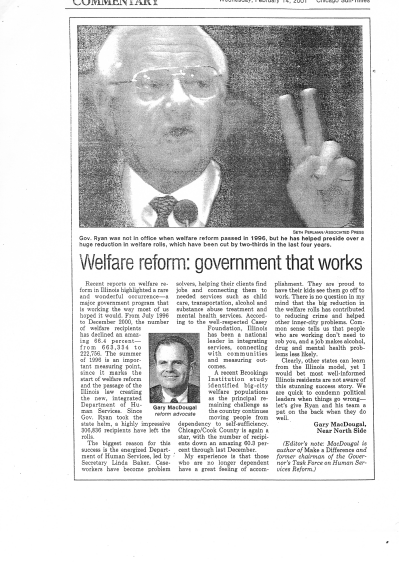Chicago Tribune
02/14/2001
Copyright (c) 2001, Chicago Tribune
By Gary MacDougal

Recent reports on welfare reform in Illinois highlighted a rare and wonderful occurrence-a major government program that is working the way most of us hoped it would. From July 1996 to December 2000, the number of welfare recipients has declined an amazing 66.4 percent - from 663,334 to 222,756. The summer of 1996 is an important measuring point, since it marks the start of welfare reform and the passage of the Illinois law creating the new, integrated Department of Human Services. Since Gov. Ryan took the state helm, a highly impressive 306,836 recipients have left the rolls.
The biggest reason for this success is the energized Department of Human Services, led by
Secretary Linda Baker. Caseworkers have become problem solvers, helping their clients find jobs and connecting them to needed services such as child care, transportation, alcohol and substance abuse treatment and mental health services. According to the well-respected Casey Foundation, Illinois has been a national leader in integrating services, connecting with communities and measuring outcomes.
A recent Brookings Institution study identified big-city welfare populations as the principal remaining challenge as the country continues moving people from dependency to self-sufficiency. Chicago/Cook County is again a star, with the number of recipients down an amazing 60.3 percent through last December.
My experience is that those who are no longer dependent have a great feeling of accomplishment. They are proud to have their kids see them go off to work. There is no question in my mind that the big reduction in the welfare rolls has contributed to reducing crime and helped other inner-city problems. Common sense tells us that people who are working don't need to rob you, and a job makes alcohol, drug and mental health problems less likely.
Clearly, other states can learn from the Illinois model, yet I would bet most well-informed Illinois residents are not aware of this stunning success story. We are quick to condemn political leaders when things go wrong - let's give Ryan and his team a pat on the back when they do well.
(Editor's note: MacDougal is author of Make a Difference and former chairman of the Governor's Task Force on Human Services Reform.)